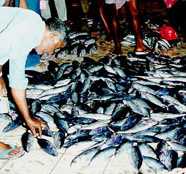|

For centuries Maldivians have been fishing in
sailing boats like this 'dhoni' and exporting
dried fish to Ceylon. Now, the dhoni has
disappeared and Ceylon has become Sri Lanka.
The Fisheries Ministry has for many years been aware of quality requirements,
an issue it faced while trying to export canned tuna to the European Union (E.U).
As a result of a lot of effort on the Ministryís part,
today the Maldives is one of the 50 countries
on the list of those who are fully approved for exporting fisheries products to the Common Market.
The EU has taken a specific decision to this effect after a team of its inspectors visited the Maldives
and satisfied itself that the local regulatory framework satisfied the requirements of its Directive 91/ 493/EEC.
Even as this positive development was taking place on one front,
rot had been creeping into quality on other fronts.
The present imbroglio is the sad, but inevitable,
culmination of this slow deterioration.

A customer visually inspects quality at
Male' fish market. Organoleptic inspections like this
form the backbone of quality control even in advanced markets.
During mid 2001, exporters admitted that quality inspectors abroad were rejecting as much as 80% of Maldivian yellow-fin tuna.
Some countries had even blacklisted the Maldives.
Even then many importers were unwilling to face the truth.
Some blamed climatic changes for the deterioration,
alleging that tuna were already damaged by the time they were caught
(Haveeru, 20th March, 2001).
This is a line we find difficult to swallow.
Itís not everyday that you see rotten fish swimming around.
The deterioration starts when the fish are caught.
It continues till they are frozen, chilled or processed.
This underscores the importance of maintaining a cold chain from the time of harvesting to the time of final sale to the end consumer.
In an interview, in January 2001, Trade Ministryís Director,
Trade Licensing, Usman Shakir highlighted a number of factors including packing and flight schedules that need to be considered in exporting yellow-fin tuna to the Japanese sashimi market.
Whatever the reason is, the deterioration of fish quality creates an anomalous situation that simply cannot continue.
One canít be on the approved list of the most stringent market in the world and yet be on the blacklist of some third world markets at the same time.
Sooner or later, something is bound to give.

Felivaru Tuna Caning Factory maintains quality
standards consistent with the best in the world.
The Fisheries Ministry has been working for sometime on formulating a national standard for quality control of fish. Speaking at a press conference in last year, Minister Abdul Rasheed Hussain declared that the Government would emphasize on the quality of tuna exports, saying that it was essential for market consolidation.
Fisheries may no longer be the main export earner for the Maldives.
Even then it remains by far the biggest source of employment for rural islands,
and unlike tourism income, fisheries income goes directly to the island folk. This makes it imperative that fisheries should be strengthened in the country.
On the bright side, the Maldives discovered several new markets including the USA and Canada last year.
But unless we improve our quality we may find them disappearing before our very own eyes as rapidly as they appeared.
| 



